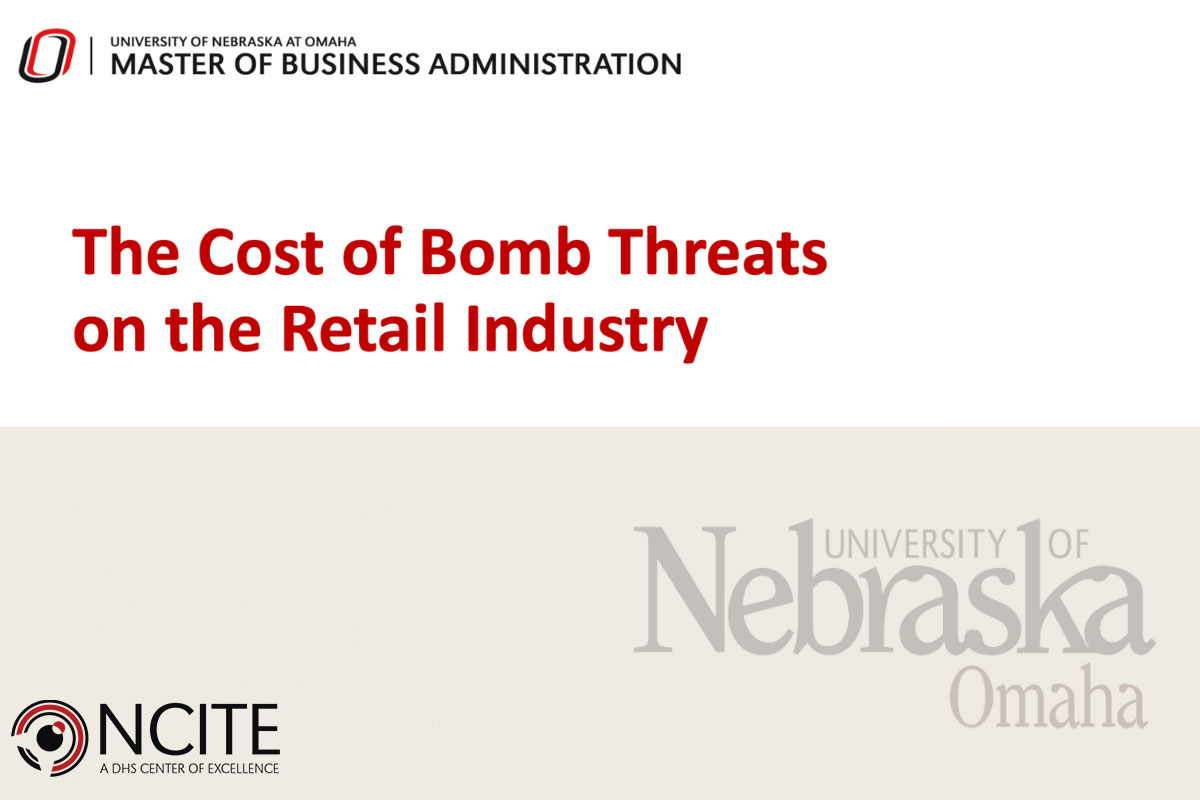How Much Can Bomb Threats Cost a Business? MBA Students Find Out in NCITE-Funded Project
The students built a tool for the Cybersecurity and Infrastructure Security Agency (CISA) that helps retail stores estimate the cost of bomb threats.
- published: 2024/04/26
- contact: NCITE Communications
- email: ncite@unomaha.edu

By Eva Burklund and Kalyn Wettengel (NCITE Students)
What is the cost of bomb threats?
In addition to the well-being and peace of mind of the people involved, bomb threats cost money. Businesses targeted with threats must close down, evacuate, and coordinate with authorities until the situation is cleared – all of which add up to lost sales.
Authorities say this is the point. The vast majority of bomb threats involve no explosive at all – the threat itself is a tactic to disrupt and harass, which can have a real financial impact on a retail business. Calculating the exact amount, however, is difficult.
This spring, a team of master’s students with the University of Nebraska at Omaha (UNO) College of Business Administration worked to create a tool that estimates how much a bomb threat can cost a business.
The capstone class is part of an NCITE project led by UNO business faculty Erin Bass, Ph.D., and Erin Pleggenkuhle-Miles, Ph.D. The project aims to engage MBA capstone students in projects that address real-world national security problems.
For this class, a team of MBA students was paired with the Cybersecurity and Infrastructure Security Agency (CISA), a component of the U.S. Department of Homeland Security (DHS).

"This project originally began with another group of capstone students in a prior session, so we had a good starting framework,” said Jacy McAllister, one of the students who worked on the project. Our goal was to build in the retail business calculations for the model while also helping to further enhance the prior team’s progress. We worked to enhance the user-friendliness of the tool – cleaner formatting, a user guide, and an appendix as a reference."
The tool focused on showing the financial costs of evacuating a given retail business in the case of a bomb threat. The hope, said Greg Portsche, another MBA student in the group, is that this tool could support government end users like CISA, as well as businesses, in making informed decisions about training and safety plans.
“We're talking (a business spending) $900 from a standpoint of training for a day for two people – giving up that $900 of payroll to hopefully prevent a $47,000 issue down the road,” Portsche said.

Because many factors affect how expensive bomb threats can be, the team’s tool allows CISA to add inputs such as average sales per day, building square footage, and more to generate a cost estimate for evacuating a store in the case of a bomb threat.
“I wish I could have worked on more projects with the ‘real-life impact’ that this capstone project had,” McAllister said.
The students were also recognized for their communication with CISA, which helped them to ultimately produce a useful product.
“I have personally enjoyed working with the University of Nebraska Omaha (UNO) MBA program, and the experience is easily one of the best I can remember in over a decade working in my current position,” Curtis Tilley, branch chief for CISA’s Office for Bombing Prevention (OBP), said in an email. “The deliverables are exceptional and will provide value for OBP as we seek to enhance national security by building public and private capabilities to deter, prevent, and respond to bombing incidents.”
Bass said the project is all the more remarkable for the time constraint the students worked under. The team only had eight weeks to communicate with CISA, identify the agency’s priorities, and develop the tool.
“It’s incredible because we get to witness over the course of eight weeks such intense learning and accomplishment … At the beginning of the eight weeks, some of the students on this team didn’t even know what CISA was,” Bass said. “The fact that these students can work so intensely on something that they started just eight weeks ago – and still deliver something that can actually be used by industry or government – it’s such a satisfying moment as a teacher to be able to witness that."
In keeping with the goal of their NCITE project, Bass said she and Pleggenkuhle-Miles are looking for more opportunities to support business students who are interested in pursuing careers or interests in homeland security.
“We need to build or help build that pipeline for these students,” Bass said. “So, when a student finishes my class, (and) they’re like, ‘Wow, this is so cool,’ how do we get them into those careers? That’s going to be the next step that we’re going to take with this project.”